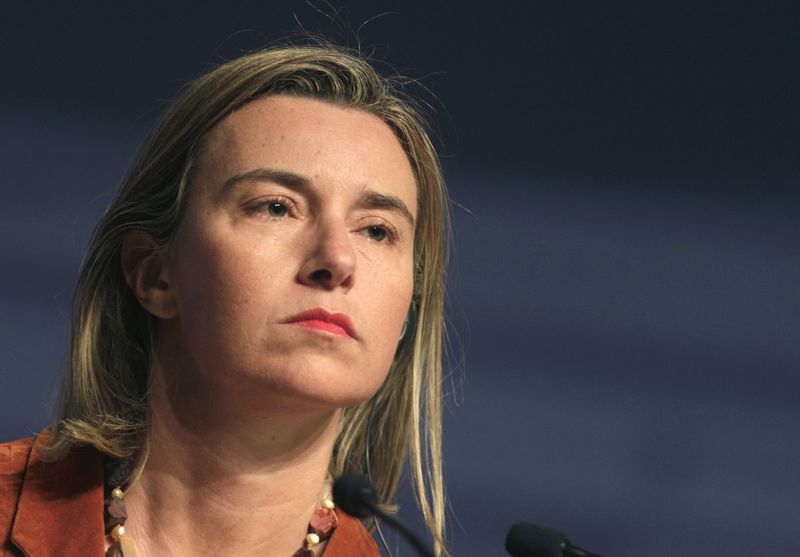By Alastair Macdonald
BRUSSELS (Reuters) - The European Union's foreign policy chief Federica Mogherini has set out ways to tempt Russia into defusing the Ukraine crisis but the divided bloc is unlikely to ease sanctions or thaw chilly relations with Moscow any time soon.
In a paper to be put to EU foreign ministers on Monday as they prepare a leaders' summit in March that will review sanctions, Mogherini suggested offering Moscow carrots of cooperation on various issues as well as the stick of economic penalties if it rejects Western demands it pull out of Ukraine.
While the document does not propose any radical or rapid change of course without big concessions from Moscow, it tests the readiness of EU countries to shift the focus of the discussions towards possible political and economic reengagement with Russia - if it fulfils a Ukraine truce accord.
Diplomats from eastern European countries most sceptical of Russia's intentions criticised Mogherini's approach as too soft on Moscow, while others from countries keen for a fresh start - and restored business ties - welcomed it as a timely review.
On both sides of the debate, however, diplomats echoed Mogherini herself in saying that maintaining the unity of the 28-nation bloc was essential. For that reason, they said, a significant break with the existing regime of sanctions on Russia was unlikely until Moscow's own position changed.
In a measure of a spreading debate on how to deal with Russia, Mogherini was drawn into a late-night spat on Twitter on Wednesday. After American journalist Anne Applebaum tweeted that Mogherini opposed EU efforts to counter Moscow propaganda, triggering numerous comments, the centre-left former Italian foreign minister tweeted back: "Never said anything like that!"
Adding spice to the argument, as commentators noted, is that Applebaum is married to Radoslaw Sikorski. A conservative Polish former foreign minister, he was a leading contender last summer for the job Mogherini now has and he is close to European Council President Donald Tusk, the former Polish prime minister.
The appointments of Tusk and Mogherini were widely seen as a combination to balance the interests of states like Poland once oppressed by Moscow with those such as Italy and France which have favoured a more conciliatory approach towards Russia.
"SPILLOVER"
Mogherini's paper, not public but reviewed by Reuters, suggested reviving cooperation with President Vladimir Putin on issues like Syria and Ebola and studying trade deals after a year of "negative spillover" from Ukraine.
Noting it was unlikely Russia would reverse its annexation of Crimea soon, it suggested linking any moves to "full implementation" of a truce accord for eastern Ukraine agreed at Minsk in September but also said the EU should "scale down" sanctions "as soon as" Russia meets its commitments.
Mogherini was not available for comment. An aide said the paper contained ideas to help structure a debate, not proposals.
One diplomat from a country strongly opposed to easing sanctions said Mogherini was pursuing a policy of "setting Ukraine to one side" to free EU states to pursue business and diplomatic advantages with Russia in other spheres. That would not be acceptable to many member states, the diplomat added.
"The battle lines haven't changed so I don't think there will be a change in policy after Monday," said another.
Speaking for a country which favours maintaining good relations with Russia, a third diplomat called the ideas "balanced" and said their timing was significant ahead of discussions on renewing sanctions in March and June.
"It's time to stop seeing all our relations with Russia through the prism of Ukraine," she said. "It's trying to break the vicious cycle of sanctions we've had for the past year."
The strongest voice is Germany. Chancellor Angela Merkel has taken a hard line lately in demanding full implementation of the Minsk accords and has rejected recent efforts to arrange a summit on the issue with Russian President Vladimir Putin.

A source in the German Foreign Ministry said it was Mogherini's job to put forward ideas, adding: "The paper is a reasonable basis for the debate the foreign ministers will have."